人教新目标(Go for it)版八年级上册Unit 2 How often do you exercise? Section B (2a~4)课件(共28张PPT)
文档属性
| 名称 | 人教新目标(Go for it)版八年级上册Unit 2 How often do you exercise? Section B (2a~4)课件(共28张PPT) |  | |
| 格式 | ppt | ||
| 文件大小 | 3.5MB | ||
| 资源类型 | 教案 | ||
| 版本资源 | 人教新目标(Go for it)版 | ||
| 科目 | 英语 | ||
| 更新时间 | 2022-10-30 14:14:10 | ||
图片预览

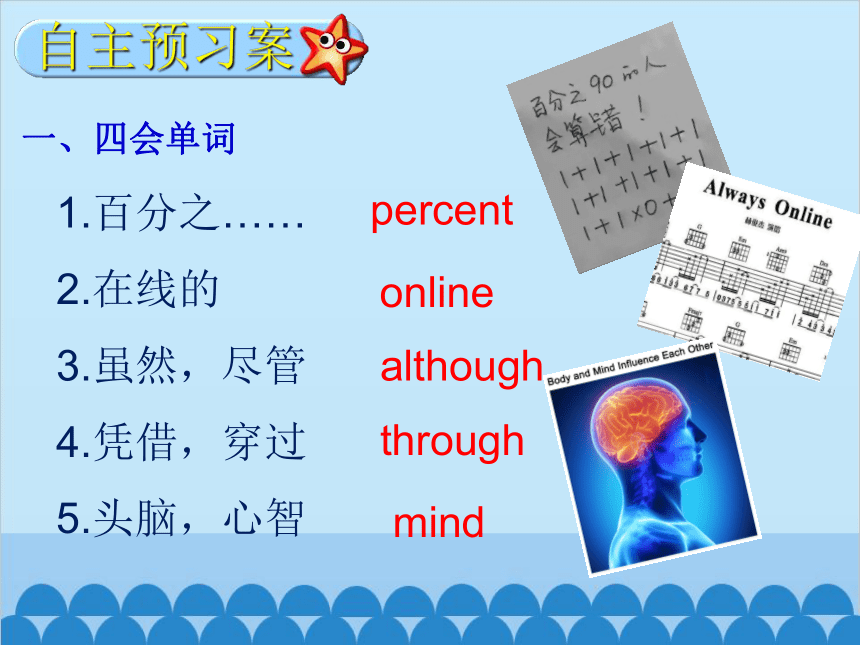
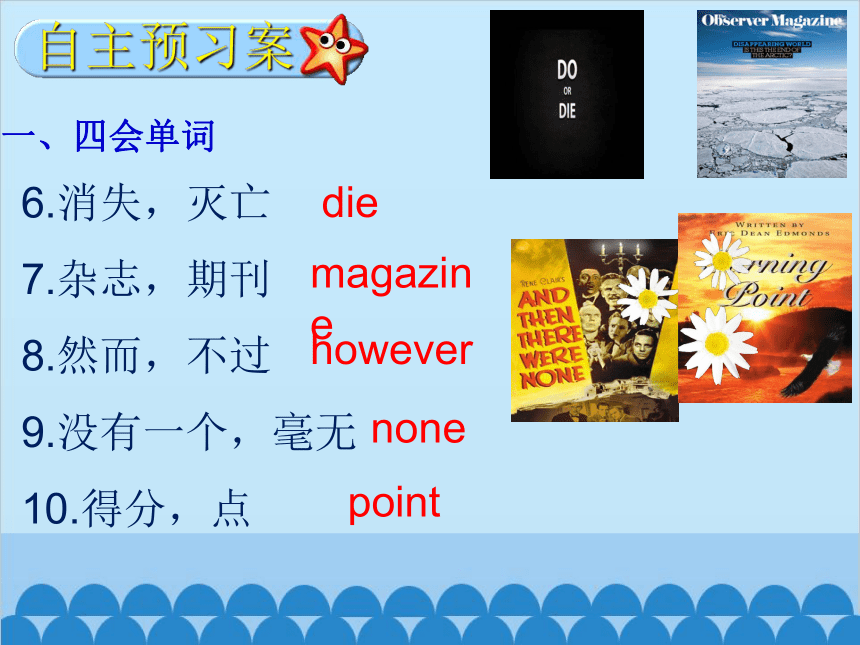
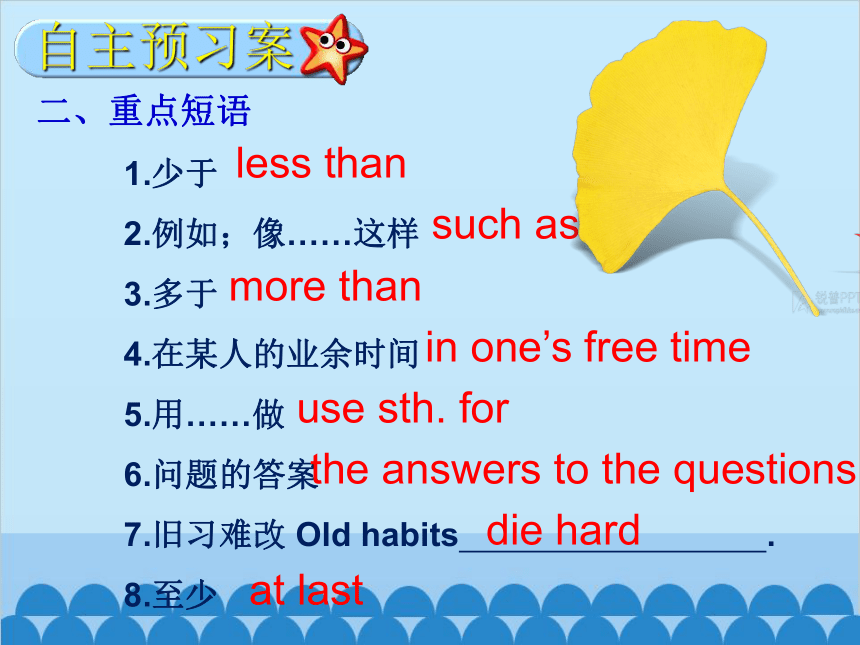


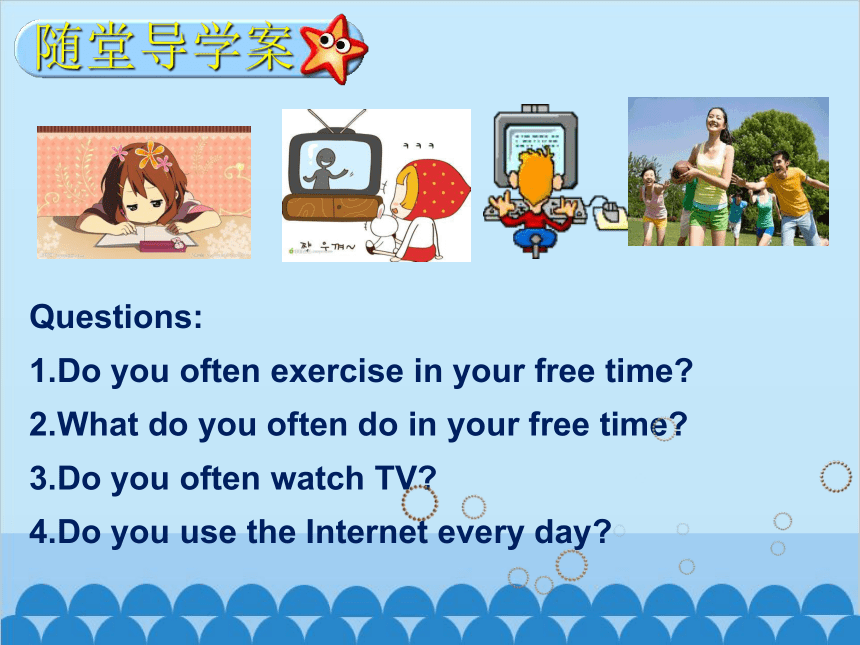
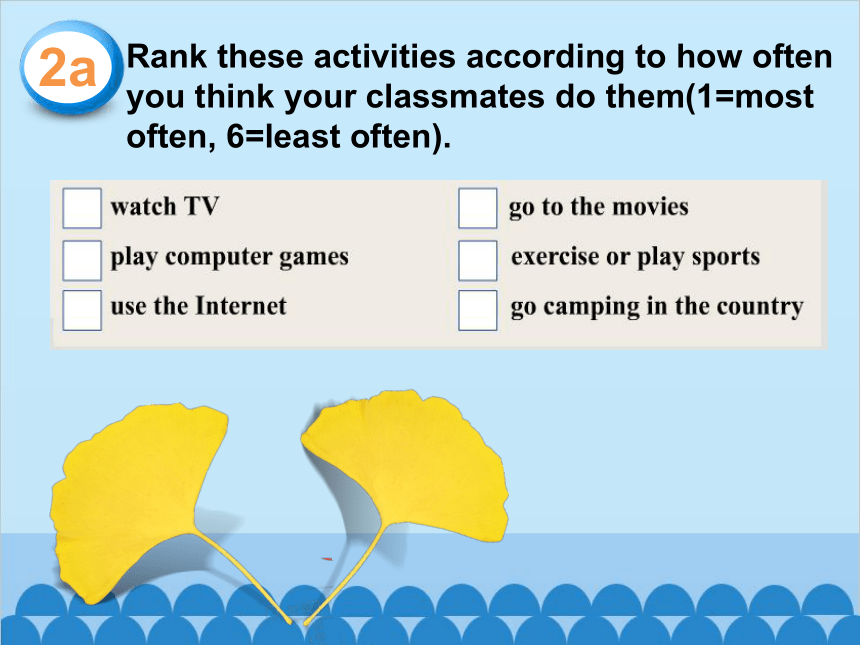
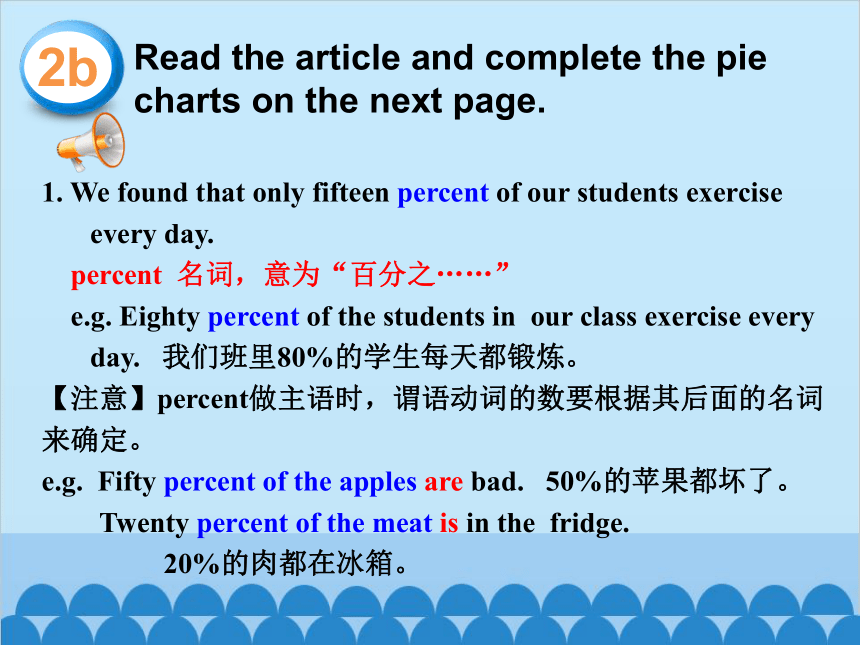
文档简介
(共28张PPT)
Unit 2 How often do you exercise
Section B (2a~4)
自主预习案
1.百分之……
2.在线的
3.虽然,尽管
4.凭借,穿过
5.头脑,心智
一、四会单词
percent
online
although
through
mind
自主预习案
6.消失,灭亡
7.杂志,期刊
8.然而,不过
9.没有一个,毫无
10.得分,点
一、四会单词
die
magazine
however
none
point
自主预习案
1.少于
2.例如;像……这样
3.多于
4.在某人的业余时间
5.用……做
6.问题的答案
7.旧习难改 Old habits .
8.至少
less than
二、重点短语
such as
more than
in one’s free time
use sth. for
the answers to the questions
die hard
at last
自主预习案
三、重要句子
1.我们都知道许多学生经常上网,但我们很惊讶他们中百分之九十的每天使用互联网。
We all know that many students often__________, but we
________________that ________________ of them use the Internet every day.
go online
were surprised
ninety percent
自主预习案
三、重要句子
2.她通常一天看两个多小时的电视。
She TV for two hours a day.
usually watches more than
随堂导学案
Questions:
1.Do you often exercise in your free time
2.What do you often do in your free time
3.Do you often watch TV
4.Do you use the Internet every day
Rank these activities according to how often you think your classmates do them(1=most often, 6=least often).
2a
Read the article and complete the pie charts on the next page.
2b
1. We found that only fifteen percent of our students exercise every day.
percent 名词,意为“百分之……”
e.g. Eighty percent of the students in our class exercise every day. 我们班里80%的学生每天都锻炼。
【注意】percent做主语时,谓语动词的数要根据其后面的名词
来确定。
e.g. Fifty percent of the apples are bad. 50%的苹果都坏了。
Twenty percent of the meat is in the fridge.
20%的肉都在冰箱。
Read the article and complete the pie charts on the next page.
2b
2. And twenty percent do not exercise at all!
not … at all 意为“一点也不”, not应和be动词、助动词或情态连用。
e.g. The story isn’t interesting at all. 那个故事一点也没有趣。
They didn’t enjoy the vacation at all.
他们根本不喜欢那次旅行。
The old man can’t use the computer at all.
那位老人一点也不会用电脑。
Read the article and complete the pie charts on the next page.
2b
3. Although many students like to watch sports, game shows are the most popular.
although 连词,“尽管,虽然;即使”
e.g. We went fishing although it was cold.
尽管天气很冷,但是我们还是去钓鱼了。
注意:although引导的从句不能与but连用。
e.g. 尽管他离家很早,但是他还是迟到了。
Although he left home early, but he was late. (×)
Although he left home early, he was late. (√)
Read the article and complete the pie charts on the next page.
2b
4. …the best way to relax is through exercise.
through 介词,课文中意为“以,凭借”
e.g. He found the job through an advertisement in the newspaper. 他通过报纸上的一个广告找到这份工作。
[拓展]
through 还有“穿过”之意。表示“从……内部穿过”。
e.g. They went through the forest yesterday.
昨天他们穿过了森林。
Read the article and complete the pie charts on the next page.
2b
5. Exercise such as playing sports is fun…
such as意为“像……这样”,表示列举。
结构常为:名词+ such as + 例子
e.g. She likes animals such as rabbits and birds.
她喜欢像兔子、小鸟这样的小动物。
注意:其后面不可列举出所有的事物。如:
我了解四种语言,例如英语、汉语。
I know four languages, such as, English and Chinese. (√)
I know four languages, such as, English, French, Japanese and Chinese. (×)
Read the article and complete the pie charts on the next page.
2b
6. Old habits die hard. 旧习难改。
这是英语中的一句谚语,表示习惯一旦养成,并非朝夕即
可改变,多用来描述人们一时难以改变的固有观念及做法。
e.g. It’s the age of new technology, but my grandpa still goes
everywhere with his old radio. Old habits die hard, you see.
现在都已经是新技术时代了,可我爷爷仍然到哪儿都带着他
的收音机。你瞧,老习惯可真难改呀。
Read the article and complete the pie charts on the next page.
2b
7. So start exercising before it’s too late!
it’s too late 为时太晚;来不及了
e.g. Now you know you’re wrong, but it’s too late.
现在你知道你错了,但是已经太晚了。
it’s too late与before共同组成从句,表示“不要等到为时已晚;
不要等到来不及的时候;趁着还来得及 ”。
e.g. You should work harder before it’s too late to catch up.
你应当更加用功,别等到为时过晚而赶不上了。
(你现在用功还赶得上。)
Read the article and complete the pie charts on the next page.
2b
15
20
20
45
10
90
13
2
85
Read the article again and answer the questions.
2c
1. How many percent of the students do not exercise at all
_________________________________
2. How many percent of the students use the Internet every day
_________________________________
Ninety percent students.
Twenty percent students.
3. How often do most students watch TV
_________________________________
What do they usually watch
_________________________________
4. What does the writer think is the best way to relax Why
5. Do you think the students in No. 5 are healthy
Why or why not
Most students watch TV every day.
They usually watch sports, game shows.
It’s healthy for the mind and the body.
_________________________________
Exercise.
No, I don’t think so.
Because most students use Internet or watch TV on their free time. They don’t like exercising. It’s unhealthy.
According to the article and the pie charts, write sentences with the percentages using always, usually or sometimes.
2d
1. 90%:____________________________________________
2. 85%: ____________________________________________
3. 45%: ____________________________________________
4. 10%:____________________________________________
5. 13%:____________________________________________
6. 2%: ____________________________________________
Eighty percent of the students always watch TV.
Ninety percent of the students always use the Internet.
Forty-five percent of the students usually exercise.
Ten percent of the students sometimes use the Internet.
Thirteen percent of the students usually watch TV.
Two percent of the students sometimes watch TV.
2e
Choose one of these free time activities or think or your own. Then ask your classmates how often they do this activity and make a pie chart. Show the pie chart to your class.
Look at the information in the chart and complete the report.
3a
every day
usually
sometimes
often
sometimes
hardly ever
never
Complete the chart with your own information. In the last column, use expressions like always, every day, twice a week and never.
3b
Activities How often
Good habits
Bad habits
Write a report about your good and bad habits. Say how often you do things. Use the report in 3a as an example.
3c
Take the health pare your results with your partner’s. Who’s healthier
4
Self Check
1 Complete the chart with activities you do and don’t do. What about your mother/father
always usually often sometimes hardly ever never
I
My mother or father
2. Write five sentences using the information above.
Self Check
3 Fill in the blanks in the conversation.
A: What do Tom and Mike do on weekends
B: They sometimes go to the museum
A: do they go to the shopping center
B: ever. Maybe about twice a month.
A: do they watch TV
B: Mike never watches TV, but Tom watches TV day.
A: Oh, I’m just like Tom. I watch TV, too.
Practice
根据汉语提示,完成句子。
1.她经常每天看两个多小时的电视。
She often watches TV two hours a day.
2.但我们认为最好的放松是锻炼。
But we think is through exercise.
for more than
the best way to relax
Thank you!
Unit 2 How often do you exercise
Section B (2a~4)
自主预习案
1.百分之……
2.在线的
3.虽然,尽管
4.凭借,穿过
5.头脑,心智
一、四会单词
percent
online
although
through
mind
自主预习案
6.消失,灭亡
7.杂志,期刊
8.然而,不过
9.没有一个,毫无
10.得分,点
一、四会单词
die
magazine
however
none
point
自主预习案
1.少于
2.例如;像……这样
3.多于
4.在某人的业余时间
5.用……做
6.问题的答案
7.旧习难改 Old habits .
8.至少
less than
二、重点短语
such as
more than
in one’s free time
use sth. for
the answers to the questions
die hard
at last
自主预习案
三、重要句子
1.我们都知道许多学生经常上网,但我们很惊讶他们中百分之九十的每天使用互联网。
We all know that many students often__________, but we
________________that ________________ of them use the Internet every day.
go online
were surprised
ninety percent
自主预习案
三、重要句子
2.她通常一天看两个多小时的电视。
She TV for two hours a day.
usually watches more than
随堂导学案
Questions:
1.Do you often exercise in your free time
2.What do you often do in your free time
3.Do you often watch TV
4.Do you use the Internet every day
Rank these activities according to how often you think your classmates do them(1=most often, 6=least often).
2a
Read the article and complete the pie charts on the next page.
2b
1. We found that only fifteen percent of our students exercise every day.
percent 名词,意为“百分之……”
e.g. Eighty percent of the students in our class exercise every day. 我们班里80%的学生每天都锻炼。
【注意】percent做主语时,谓语动词的数要根据其后面的名词
来确定。
e.g. Fifty percent of the apples are bad. 50%的苹果都坏了。
Twenty percent of the meat is in the fridge.
20%的肉都在冰箱。
Read the article and complete the pie charts on the next page.
2b
2. And twenty percent do not exercise at all!
not … at all 意为“一点也不”, not应和be动词、助动词或情态连用。
e.g. The story isn’t interesting at all. 那个故事一点也没有趣。
They didn’t enjoy the vacation at all.
他们根本不喜欢那次旅行。
The old man can’t use the computer at all.
那位老人一点也不会用电脑。
Read the article and complete the pie charts on the next page.
2b
3. Although many students like to watch sports, game shows are the most popular.
although 连词,“尽管,虽然;即使”
e.g. We went fishing although it was cold.
尽管天气很冷,但是我们还是去钓鱼了。
注意:although引导的从句不能与but连用。
e.g. 尽管他离家很早,但是他还是迟到了。
Although he left home early, but he was late. (×)
Although he left home early, he was late. (√)
Read the article and complete the pie charts on the next page.
2b
4. …the best way to relax is through exercise.
through 介词,课文中意为“以,凭借”
e.g. He found the job through an advertisement in the newspaper. 他通过报纸上的一个广告找到这份工作。
[拓展]
through 还有“穿过”之意。表示“从……内部穿过”。
e.g. They went through the forest yesterday.
昨天他们穿过了森林。
Read the article and complete the pie charts on the next page.
2b
5. Exercise such as playing sports is fun…
such as意为“像……这样”,表示列举。
结构常为:名词+ such as + 例子
e.g. She likes animals such as rabbits and birds.
她喜欢像兔子、小鸟这样的小动物。
注意:其后面不可列举出所有的事物。如:
我了解四种语言,例如英语、汉语。
I know four languages, such as, English and Chinese. (√)
I know four languages, such as, English, French, Japanese and Chinese. (×)
Read the article and complete the pie charts on the next page.
2b
6. Old habits die hard. 旧习难改。
这是英语中的一句谚语,表示习惯一旦养成,并非朝夕即
可改变,多用来描述人们一时难以改变的固有观念及做法。
e.g. It’s the age of new technology, but my grandpa still goes
everywhere with his old radio. Old habits die hard, you see.
现在都已经是新技术时代了,可我爷爷仍然到哪儿都带着他
的收音机。你瞧,老习惯可真难改呀。
Read the article and complete the pie charts on the next page.
2b
7. So start exercising before it’s too late!
it’s too late 为时太晚;来不及了
e.g. Now you know you’re wrong, but it’s too late.
现在你知道你错了,但是已经太晚了。
it’s too late与before共同组成从句,表示“不要等到为时已晚;
不要等到来不及的时候;趁着还来得及 ”。
e.g. You should work harder before it’s too late to catch up.
你应当更加用功,别等到为时过晚而赶不上了。
(你现在用功还赶得上。)
Read the article and complete the pie charts on the next page.
2b
15
20
20
45
10
90
13
2
85
Read the article again and answer the questions.
2c
1. How many percent of the students do not exercise at all
_________________________________
2. How many percent of the students use the Internet every day
_________________________________
Ninety percent students.
Twenty percent students.
3. How often do most students watch TV
_________________________________
What do they usually watch
_________________________________
4. What does the writer think is the best way to relax Why
5. Do you think the students in No. 5 are healthy
Why or why not
Most students watch TV every day.
They usually watch sports, game shows.
It’s healthy for the mind and the body.
_________________________________
Exercise.
No, I don’t think so.
Because most students use Internet or watch TV on their free time. They don’t like exercising. It’s unhealthy.
According to the article and the pie charts, write sentences with the percentages using always, usually or sometimes.
2d
1. 90%:____________________________________________
2. 85%: ____________________________________________
3. 45%: ____________________________________________
4. 10%:____________________________________________
5. 13%:____________________________________________
6. 2%: ____________________________________________
Eighty percent of the students always watch TV.
Ninety percent of the students always use the Internet.
Forty-five percent of the students usually exercise.
Ten percent of the students sometimes use the Internet.
Thirteen percent of the students usually watch TV.
Two percent of the students sometimes watch TV.
2e
Choose one of these free time activities or think or your own. Then ask your classmates how often they do this activity and make a pie chart. Show the pie chart to your class.
Look at the information in the chart and complete the report.
3a
every day
usually
sometimes
often
sometimes
hardly ever
never
Complete the chart with your own information. In the last column, use expressions like always, every day, twice a week and never.
3b
Activities How often
Good habits
Bad habits
Write a report about your good and bad habits. Say how often you do things. Use the report in 3a as an example.
3c
Take the health pare your results with your partner’s. Who’s healthier
4
Self Check
1 Complete the chart with activities you do and don’t do. What about your mother/father
always usually often sometimes hardly ever never
I
My mother or father
2. Write five sentences using the information above.
Self Check
3 Fill in the blanks in the conversation.
A: What do Tom and Mike do on weekends
B: They sometimes go to the museum
A: do they go to the shopping center
B: ever. Maybe about twice a month.
A: do they watch TV
B: Mike never watches TV, but Tom watches TV day.
A: Oh, I’m just like Tom. I watch TV, too.
Practice
根据汉语提示,完成句子。
1.她经常每天看两个多小时的电视。
She often watches TV two hours a day.
2.但我们认为最好的放松是锻炼。
But we think is through exercise.
for more than
the best way to relax
Thank you!
同课章节目录
- Unit 1 Where did you go on vacation?
- Section A
- Section B
- Unit 2 How often do you exercise?
- Section A
- Section B
- Unit 3 I'm more outgoing than my sister.
- Section A
- Section B
- Unit 4 What's the best movie theater?
- Section A
- Section B
- Unit 5 Do you want to watch a game show?
- Section A
- Section B
- Unit 6 I'm going to study computer science.
- Section A
- Section B
- Unit 7 Will people have robots?
- Section A
- Section B
- Unit 8 How do you make a banana milk shake?
- Section A
- Section B
- Unit 9 Can you come to my party?
- Section A
- Section B
- Unit 10 If you go to the party, you'll have a grea
- Section A
- Section B
